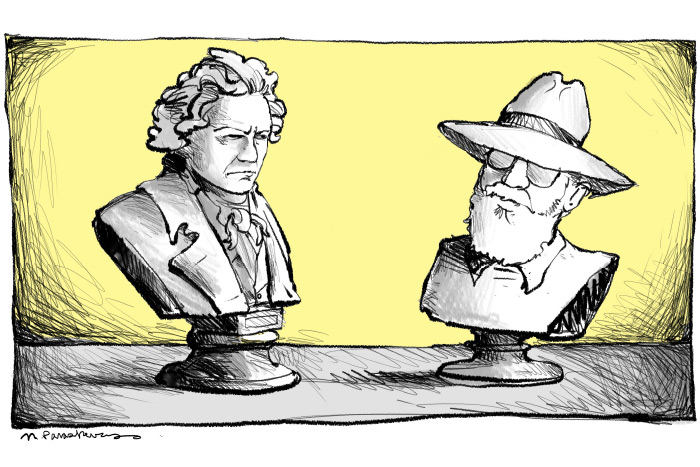Da, Da, Da, DAAAAH! Beethoven's Life and Why His Fifth Is the Best

BEETHOVEN’S FIRST: You don’t hear much about Beethoven’s First. The reason is that it was not much good. On the other hand, it was remarkable he had even done one. He was only five years old at the time. His teacher, who had been instructing him on the piano since he was three, said this was the best piece of writing by a child that age in the entire city of Vienna. It was also remarkable because he had knocked it out in such a short period of time. He’d written the entire thing in just a day and a half. His parents, who were well-to-do, gave performances of Beethoven’s First in their home for their friends, who applauded and cheered the young lad and said it was absolutely brilliant. But after Beethoven was put to bed (at 8:30 p.m.), they all did say that it was brilliant, of course, within the context of his being five years old.
SYMPHONY NUMBER TWO: This symphony was written when he was nine. He worked on it for weeks, going back over it again and again, each time changing it so that the time he wrote it in the fall was just completely different than what he had written in the spring. Finally, he showed it to his mother. She praised the work, said it was brilliant, but there didn’t seem to be the sort of enthusiasm in her voice that there had been before. Beethoven threw the final draft in the fire. Earlier drafts exist, but they are rarely played.
THE THIRD SYMPHONY (Eroica): At 16, Beethoven fell in love with a beautiful young girl named Adriana, who was a year older and a member of high society, which Beethoven was not. She did like him a lot, but not enough to overcome the objections of her parents, who were members of the Viennese royal family and frequently welcome at court. When she told Beethoven she had to break up with him, she cried, and then ran off. Beethoven did not chase her. But instead, working 72 hours without sleep, completed the highly passionate ode to love that became Eroica, Beethoven’s Third. It was widely praised, and rightly so. Moving and alternately sad and proud, it brought listeners to tears. It still does. This was the work of a fine young composer indeed.
THE FOURTH SYMPHONY: This is also rarely played. Beethoven wrote it in the style of the composer Max Von Heering, widely regarded back then but little noted after his death. Beethoven was 22 years old at the time and was apprenticing to the great master. Though not crazy about the work himself, Beethoven showed it to Von Heering, who told Beethoven great things could come of him in a few years. He encouraged Beethoven to continue, said Beethoven could do better, and urged Beethoven not to release it. Indeed, Beethoven hid the manuscript in a closet, and only recently has it been discovered. It has not been played yet. As for Von Heering, he is most praised today for offering Beethoven encouragement and urging him to continue.
THE FIFTH SYMPHONY: This is Beethoven’s masterwork. Beethoven had completed his apprenticeship with Von Heering and, with help from family and friends, had opened his own composing studio in Vienna. He was 28. Surrounded by and encouraged by these people, Beethoven mostly suffered from writer’s block during the day, but then worked through the nights with unrelenting passion and focus. After six months it was done. Beethoven’s Fifth. Perhaps the single greatest work of music ever created on this planet. A triumph. Beethoven toured. He became world famous.
THE SIXTH SYMPHONY: After the tours were over and the excitement died down, Beethoven returned to his studio to write the Sixth Symphony in the same way he had written the Fifth. He caroused all day with hangers on, then worked all night, now aided by some drugs to keep him alert and excited. He lost a lot of weight. But when it was done he considered it a triumph. Critics disagreed. They noted that the work of most famous composers slips down a notch after their masterwork.
THE SEVENTH SYMPHONY: Beethoven continued to work in the same fashion as he had before. But now he wasn’t so sure of himself and kept writing Number Seven and throwing it in the fire and writing it again and throwing it in the fire. Eventually, he declared he could only go on if he just skipped Number Seven and went on to Number Eight. He was 41 at this time. Some people thought he should consider rehab, and told him so. Number Seven remains skipped over.
THE EIGHTH SYMPHONY: Beethoven took a long vacation after the aborted Seventh. He traveled the world. Rome. Egypt. Palestine. Florence. Paris. Madrid. This was in the 18th century, and that was the western world as they knew it at the time—the rest were colonies. He was praised wherever he went, and people asked him for his autograph all the time, which he would sign “Best of Luck from Beethoven, who Took the Fifth.” It was a sort of in-joke, Beethoven said, but most people just walked away puzzled. Eventually, he wrote the Eighth, mostly on the back of bar napkins in nightspots he was frequenting at that time—now in his mid-50s, he was a big hit with the women and world famous—but he knew it wasn’t much good. He put it out there anyway and it sort of flopped, but most critics were kind to him and would start out by saying that on certain occasions the old punch was still there and it sent a thrill through them, but then they sort of dozed off. They couldn’t wait for him to do his next one.
THE NINTH SYMPHONY: In his mid-60s, when Beethoven tackled this symphony, he discovered to his dismay that he was becoming deaf. He could hear a few things if you shouted, though. Inside, he still had this dramatic, passionate, impatient and ethereal theme he could hum, and he was determined to get it out. He began writing, and out it was coming, but when he got about three-quarters the way through to where the Andante comes in, he couldn’t hear it at all. His students pitched in—Beethoven was broke by this time—and acquired the services of the massive Hoffenfeffer Berlin and Hamburg Cathedral Choir to come to his studio and sing and shout along with the notes. This was so effective that Beethoven could clearly hear it, and, overjoyed, he kept them on right through the Presto and then to the Grand Finale, which rose to the joyful and triumphant ending that everyone knows and enjoys today.
As for Beethoven, he said enough was enough. And though he couldn’t hear at all at this point, his students announced to the world that Beethoven was retiring, which he did. He spent his last years reading newspapers and magazines in a modest home in Speyer Aub der Rhine. Meanwhile, the Hoffenfeffer Berlin and Hamburg Cathedral Choir became famous on its own and frequently was urged to sing the Ninth, which it did. This choir became quite famous for a time. Beethoven, though, never knew.



